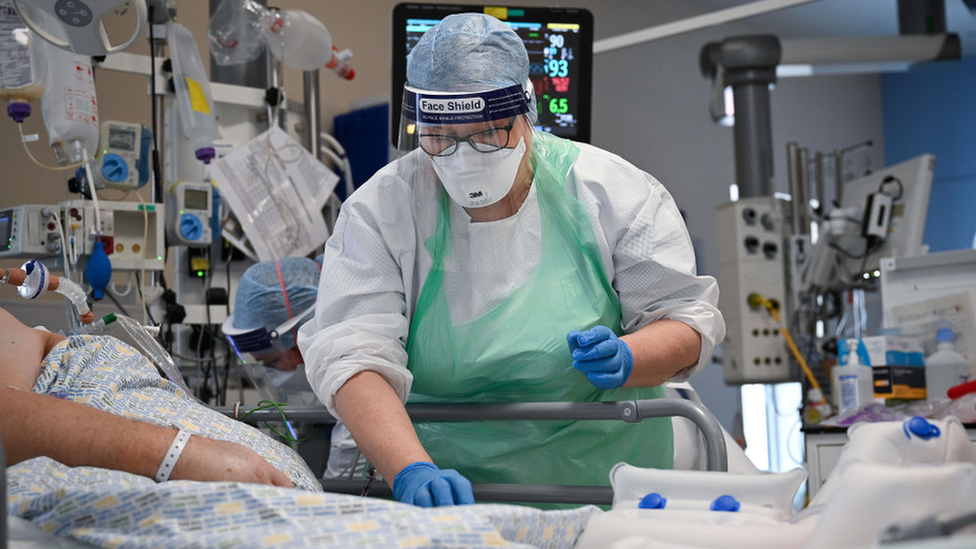Five hospital wards run with one registered nurse each
- Published
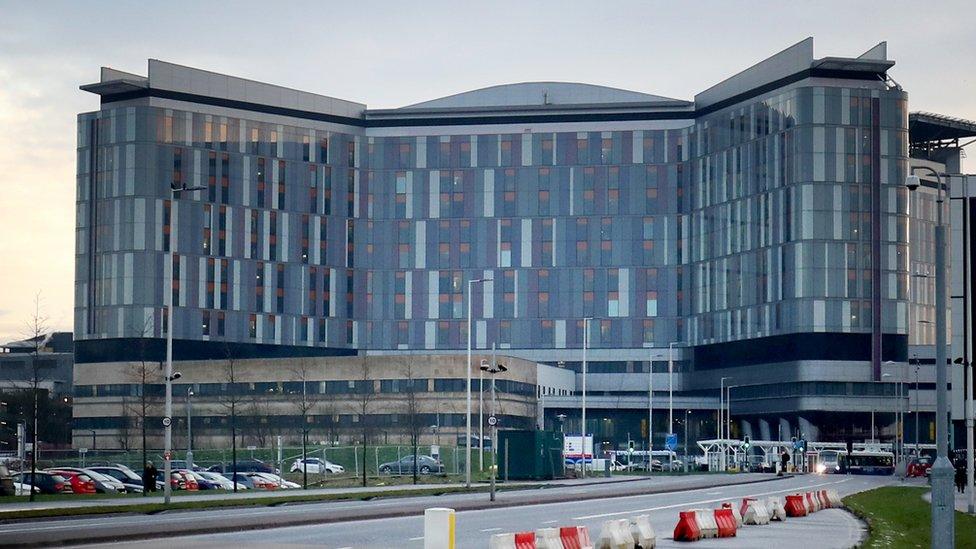
The Queen Elizabeth University Hospital in Glasgow opened in 2015
Five wards at Scotland's largest hospital had to operate with one registered nurse on duty each.
Staff at the Queen Elizabeth University Hospital in Glasgow experienced the shortage on Monday night.
It is an example of the severe pressure affecting health services across the country, which has intensified due to the Covid-19 pandemic.
Greater Glasgow and Clyde health board said nurses were supported by a number of other staff.
Originally reported in the Daily Record, external, the shortage was described to staff in an email sent on Monday afternoon.
The email said nurse staffing levels across medicine were critical, despite attempts to seek support from bank or agency workers.
It said admin staff had been asked to stay on to offer support including answering phones and door buzzers for the rest of the week.
It added the wards affected were 5A&B (diabetes), 6B (rheumatology), 6C (cardiology), 7A (respiratory) and 8C (gastroenterology) "who will only have one registered nurse tonight".
The health board said across five wards, there were 19 staff - nurses and health care support workers - for the full shift.
A further two registered nurses supported the shift until 02:00, it said.
The BBC understands two out of the five wards were supported by mental health nurses.
One ward had one registered nurse for the full night shift.
A Greater Glasgow and Clyde spokesman added: "In addition, there were three clinical nurse co-ordinators, increased from the normal two on duty, working closely to support the wards. At all times, ward teams had access to medical colleagues.
"To help deal with current pressures, our sites have safety huddles throughout the day, where issues relating to patient care and safety are prioritised. Our frequent safety huddles support prompt escalation of any risks and facilitate the appropriate movement of our nursing workforce to support high priority areas.
"We fully understand the significant pressures faced by our teams and we are sorry if any have been negatively impacted by the challenges."
Patient safety 'at risk'
As well as staffing problems, the pandemic has caused more bed blocking in Scotland's hospitals and longer waits for both emergency and outpatient treatment.
Health Secretary Humza Yousaf has warned recovering from the pandemic is going to take the NHS in Scotland years not months.
Norman Provan, associate director at the Royal College of Nursing Scotland said the shortage had an impact on patient safety as well as staff wellbeing - concerns that had been raised with the health board and the Scottish government.
He added: "We're in this situation largely because of the failure of Scottish government to address the nursing workforce crisis, which has seen registered nurse vacancies reach a record high.
"Urgent action is needed to protect patient safety, address staff shortages and demonstrate that the nursing workforce is valued as a safety critical profession."
The Scottish government said it understood the health board had grappled with challenges.
A spokesperson said: "We welcome that the board had over 3,400 staff in its Acute South Sector and that a further 180 registered nurses will soon be joining them.
"The pandemic continues to cause significant challenges with Covid related absence in the NHS. We will continue to work with boards to enhance staffing levels and aid the recovery of our health service."
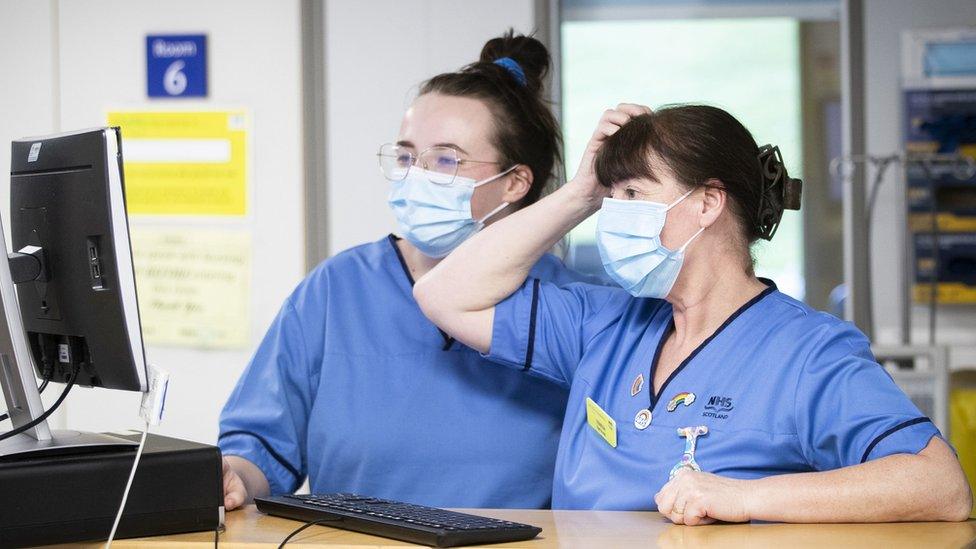
On Saturday NHS staff held a protest in Glasgow's George Square over the Scottish government's 5% pay offer.
The Royal College of Nursing and Unison have both opened ballots to see if members want to reject the offer and if they would consider industrial action if a new deal cannot be reached.
Melanie Gale, organiser for the campaign group NHS Workers United for Scotland, told the BBC the pay offer "didn't touch the sides" of the costs staff face due to inflation - and that it risked struggling staff leaving the profession.
Meanwhile in June, Mr Yousaf said NHS and social care staff were "completely knackered" due to the fall-out, after health boards failed to meet A&E targets again.
The Scottish government has a target of dealing with 95% of patients who come to an emergency department within four hours.
In April, the figure was just 46% at the Queen Elizabeth University Hospital.
A nursing union has previously warned some nurses are retiring when they do not want to because of a lack of flexibility from Scotland's health boards.
Figures showed nearly one in 10 nursing and midwifery posts are vacant - though the Scottish government said staffing across the NHS was at a record high.
- Published5 July 2022
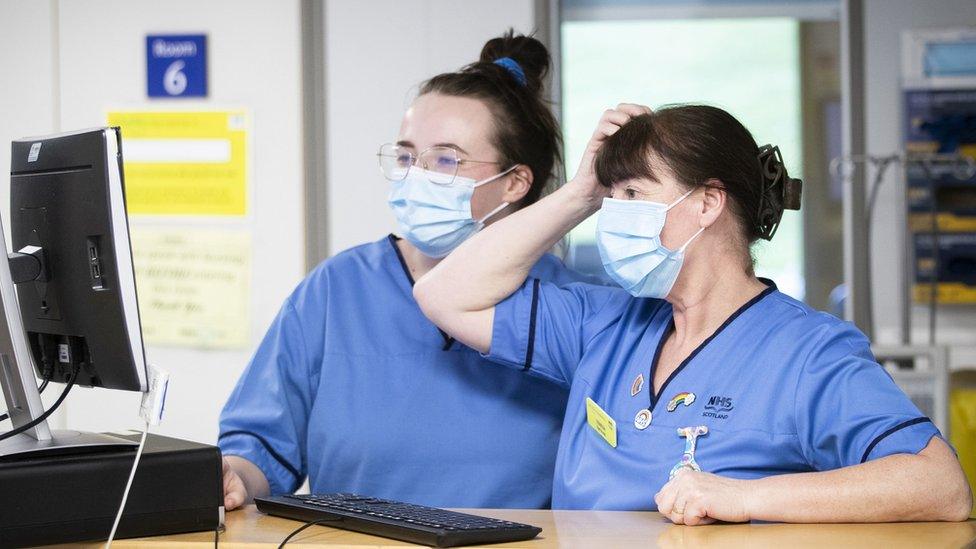
- Published15 June 2022
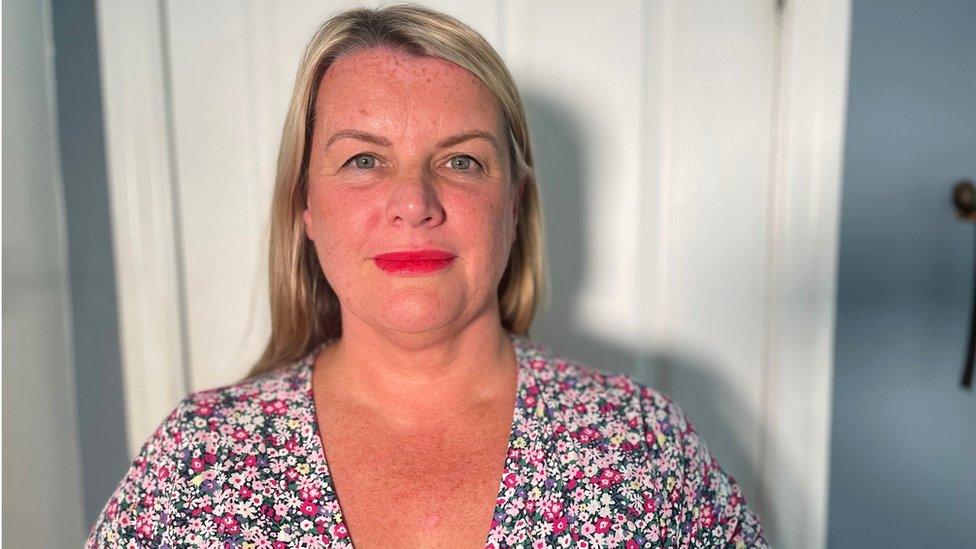
- Published13 June 2022
